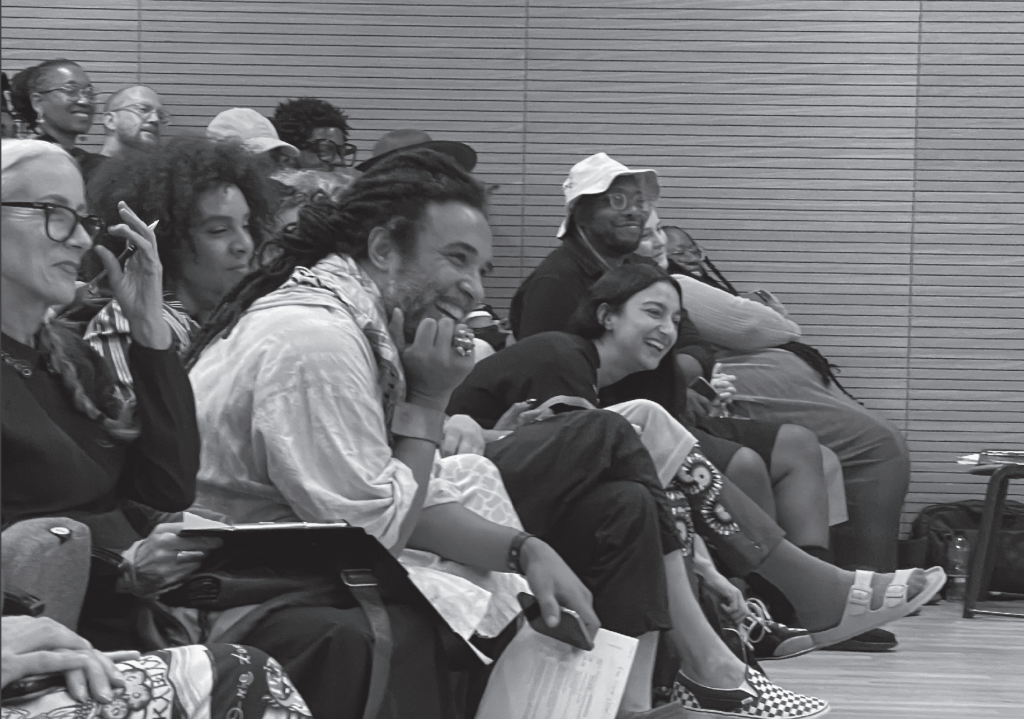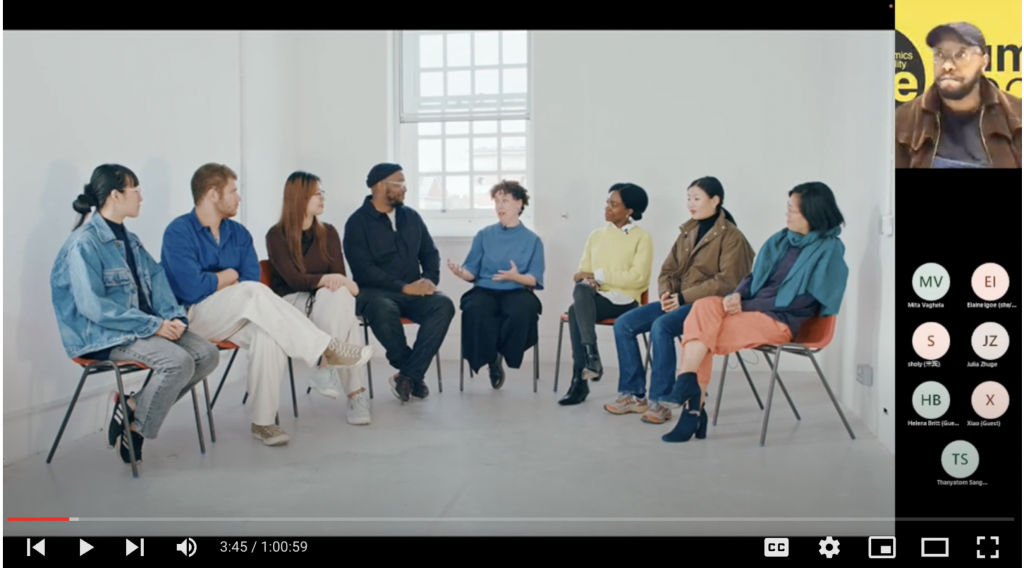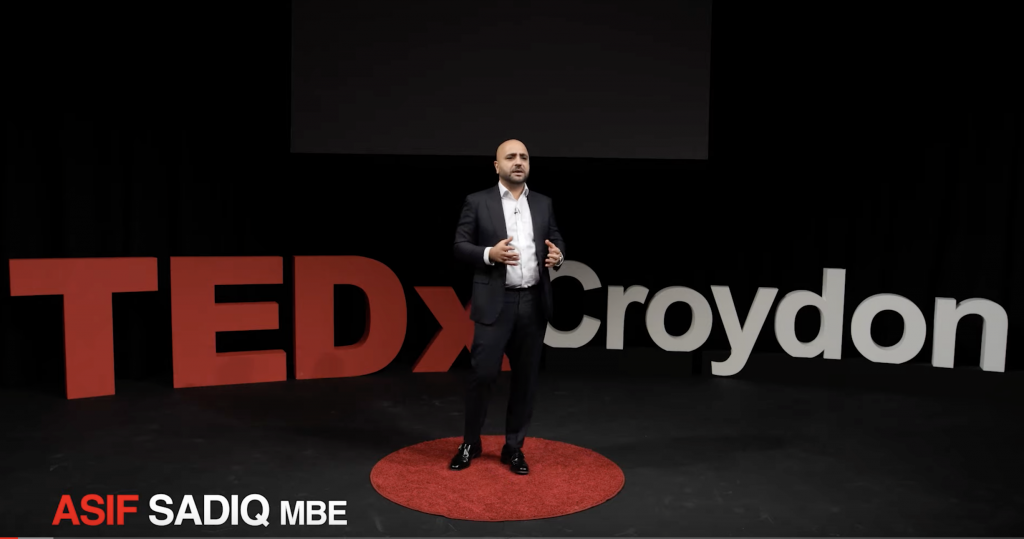
Introduction
Firstly, it’s important to acknowledge because of the subject matter how challenging this particular reading list/material was for me personally to engage with. Primarily because of my own background and positioning.
As a middle aged, cis gendered black British male, neurodivergent creative academic, a Londoner raised in a black Caribbean household, I’ve considered the core themes of the Inclusive practise unit for many years. This consideration accelerated in the wake of George Floyd by seeking out support, initially through a series of online zoom conversations exploring my lived experiences and inclusive practice with a wider online community of predominantly black and South Asian creative academics nationally throughout the pandemic. Together, we founded FACE, Fashion and the Arts Creating Equity.
‘FACE is a not-for profit organisation dedicated to catalysing transformation within Higher Education Arts and Design fields, and the creative industries. Our mission is to champion equity, inclusivity and unity, with a specific focus on addressing issues related to race, colour, and ethnicity.
We believe in interrogating the euro-centric gaze and exploring the etymology of fashion, identity, colonisation and neo-colonisation to disrupt norms and foster progressive dialogue, thus facilitating a landscape where diversity is normalised and celebrated. We commit to amplifying marginalised voices through collaborative efforts and unwavering advocacy. We will inspire, educate, and empower individuals within academic and industry spheres to dismantle systemic barriers, fostering a more equitable and harmonious future for all’.
(FACE mission statement 2024)
Study,Analysis & Response

Garret’s Racism Shapes Careers paper explores the future career trajectories amongst racialised minority PHD’s in UK higher education and points out the following;
- In the UK 90.1 % of professorships are occupied by white professors.
- 4 % are Asians
- 2.3 % Chinese
- 1.6 % Mixed
- 1.4 % Other
- 0.7 % Black
The statistics were taken from Advanced HE report 2022.
I personally have been aware of the lack of diversity within higher education and industry through my lived experience navigating my way throughout HE and my career progression within industry. For the first FACE summit held at CSM in 2022 I lead a panel discussion on the topic ‘expectation of diversity in textile education and industry’, three academics and three students from the BA Hons Textile Design course were joined by two industry experts who all took part in the discussion which was filmed. You can watch the film here.
FACE YouTube Film link here
Bradbury, A., 2020. A critical race theory framework for education policy analysis discusses Critical Race Theory which I first became aware of through my knowledge sharing community building zoom calls with FACE members. In November 2020.
I led a FACE community Eventbrite presentation online.
‘FACE Community gathered a mixed audience of 60 guests through Eventbrite for a presentation by FACE members Nick Dunn and Lorraine Henry King who asked…
Do we feel debate and discussions on CRT and structural inequality are valid and rewarding topics within fashion education in the UK?
Members shared personal stories to educate on the reality of privilege, ignorance and why CRT is a vital lens through which to view race’.
(FACE community CRT, 2020)
As I touched upon at the beginning, I found the reading list difficult to engage with. It’s always challenging engaging with this subject as generally, what is written focuses on the inequality that may hinder people of colours progression towards their life ambitions. For these reasons the more knowledge I gain about systemic inequality, the more I try to concentrate on conversations/presentation/discussions focused on progression and equitable solution paths.

It’s for this reason I found Adiq Sadiq’s Ted talk ‘Why aren’t we achieving change/success in diversity equity and inclusion’ engaging as he provides thoughts and opinions on how to progress that stem from his own positioning and life experience as a Muslim student and academic. Sadiq gives the following progressive points that I intend to consider going forward in my practice as an educator:
- Diversity has never been about us all agreeing, if we all agreed on the same things that wouldn’t be diverse.
- Diversity is about bringing different perspectives together, and then working towards better goals.
- We need to diversify the content we teach and in turn the content we put in for people to learn.
- Localising the diverse experiences, giving academic teams and individuals more ownership of discovering their cohorts unique diverse make up and making programme delivery of knowledge less centralised.
- Storytelling, we learn through stories, having training that gets a group of colleagues together sharing experiences that’s very impactful as we learn through each other. Human interaction is the best learning we could ever have!
- Moving away from the notion that there’s only one form of education when it comes to diversity, traditional classroom-based learning is good but what about experiential learning, how do we create experiences that drive change. Experiences are a powerful tool for learning.
- Diversifying our experiences to happen not just in our workplace or schools.
- Group Learning
- How do we create physiologically safe environments when there’s so much fear of offending someone? Not knowing the right terminology etc.
- People taking offence can’t be mitigated if we’re not talking in diverse groups, asking someone what ‘is’ the right phrase and having the confidence to say you’d like to know more, and sharing.
To the above point after many group discussions of which I participated over the past four years around the topic of appropriate language, FACE members have created the first edition of the FACE Race Handbook, you can download it here Download FACE RACE Handbook
- Sadiq states ‘I have never been offended by someone asking a question, but I have been by someone making an assumption as to what my needs are’.
- Self-led learning, learning is our own responsibility whether this is traditional or experiential learning.
- It is not the responsibility for anyone to educate anyone, we can only champion that learning.
I personally have had the experience and heard from peers from minority communities having people approach them asking to teach them about their experiences. Not everyone wants to share these experiences and it is not their responsibility to share what can be traumatic, triggering experiences in order for others to learn. It should not be the burden of underrepresented groups to educate someone else. The responsibility fundamentally lies with the individual to seek out and educate themselves.
- These topics are uncomfortable, Sadiq goes on to say we need to get comfortable with being uncomfortable, a point widely agreed with and explored by FACE.
- Sadiq’s finally states that when we think about learning in the diversity space it can’t be as merely a two-hour module, it has to be approached as a life long journey within the workplace.
- For learning to be impactful it has to be continuous!
Conclusion
As I have pointed out I arrived into the IPU with a foundation of knowledge on the topics covered but the workshops, tutorials my tutor Annabel and group discussions with academic peers have built upon that primary knowledge giving me more confidence to implement this gained knowledge into my practice going forward.
Bibliography:
Journal articles:
Bradbury, A., 2020. A critical race theory framework for education policy analysis: The case of bilingual learners and assessment policy in England. Race Ethnicity and Education, 23(2), pp.241-260. Read pages 241-247. Available to download from Moodle via the Readings & Resources folder.
Garrett, R. (2024). Racism shapes careers: career trajectories and imagined futures of racialised minority PhDs in UK higher education. Globalisation, Societies and Education, pp.1–15. Read pages 2-5 & 7-11. Available to download from Moodle via the Readings & Resources folder.
16 minute talk:
Sadiq, A. (2023) Diversity, Equity & Inclusion. Learning how to get it right. TEDx [Online}. Youtube. 2 March. Available at: https://www.youtube.com/watch?v=HR4wz1b54hw
9 minute video:
Orr, J. (2022) Revealed: The charity turning UK universities woke. The Telegraph [Online]. Youtube. 5 August. Available at: https://www.youtube.com/watch?v=FRM6vOPTjuU
4 minute clip:
Channel 4. (2020) The School That Tried to End Racism. [Online}. Youtube. 30 June. Available at: https://www.youtube.com/watch?v=1I3wJ7pJUjg
FACE SUMMIT – 2022: Expectations of Diversity in Textiles Education@centralsaintmartinsfashion3613